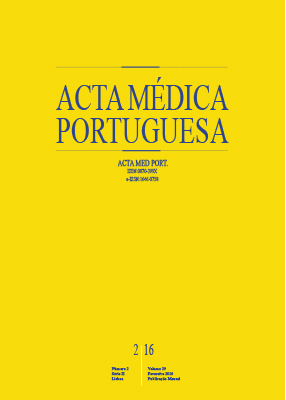Post-Surgical Quality of Life, Psychological State and what Patients Think about the Effectiveness of Heller Myotomy in the Treatment of Achalasia
DOI:
https://doi.org/10.20344/amp.6758Keywords:
Anxiety, Depression, Digestive System Surgical Procedures, Esophageal Achalasia, Laparoscopy, Quality of life.Abstract
Introduction: The disruption of esophageal motility that characterizes achalasia typically provokes dysphagia, pain, loss of weight and malnutrition. Therefore, patients frequently report a reduction in quality of life and negative emotional states. Laparoscopic Heller myotomy proved to be an effective therapy, enabling the resumption of good quality of life.
Material and Methods: The authors studied 45 patients previously submitted to laparoscopic Heller myotomy. Postoperative evaluation was performed using a customized version of the achalasia disease-specific quality of life questionnaire. Quality of life and the presence of depressive and anxiety symptoms were assessed using the Portuguese versions of the Medical Outcomes Study SF-36 and the Hospital Anxiety and Depression Scale.
Results: Thirty-one patients responded to the survey. Dysphagia was the main clinical symptom before surgery. A clear improvement in dysphagia, regurgitation, pain and weight loss was found after surgery (p < 0.001). The Mental Health domain of SF-36 presented a Pearson correlation coefficient of -0.689 with HADS-D and of -0.557 with HADS-A (p < 0.001 and p = 0.002, respectively).
Conclusion: This study demonstrates that the Heller myotomy is associated with a good quality of life in patients with achalasia and strengthens the evidence that this is a safe and reliable procedure.
Downloads
Downloads
Published
How to Cite
Issue
Section
License
All the articles published in the AMP are open access and comply with the requirements of funding agencies or academic institutions. The AMP is governed by the terms of the Creative Commons ‘Attribution – Non-Commercial Use - (CC-BY-NC)’ license, regarding the use by third parties.
It is the author’s responsibility to obtain approval for the reproduction of figures, tables, etc. from other publications.
Upon acceptance of an article for publication, the authors will be asked to complete the ICMJE “Copyright Liability and Copyright Sharing Statement “(http://www.actamedicaportuguesa.com/info/AMP-NormasPublicacao.pdf) and the “Declaration of Potential Conflicts of Interest” (http:// www.icmje.org/conflicts-of-interest). An e-mail will be sent to the corresponding author to acknowledge receipt of the manuscript.
After publication, the authors are authorised to make their articles available in repositories of their institutions of origin, as long as they always mention where they were published and according to the Creative Commons license.









